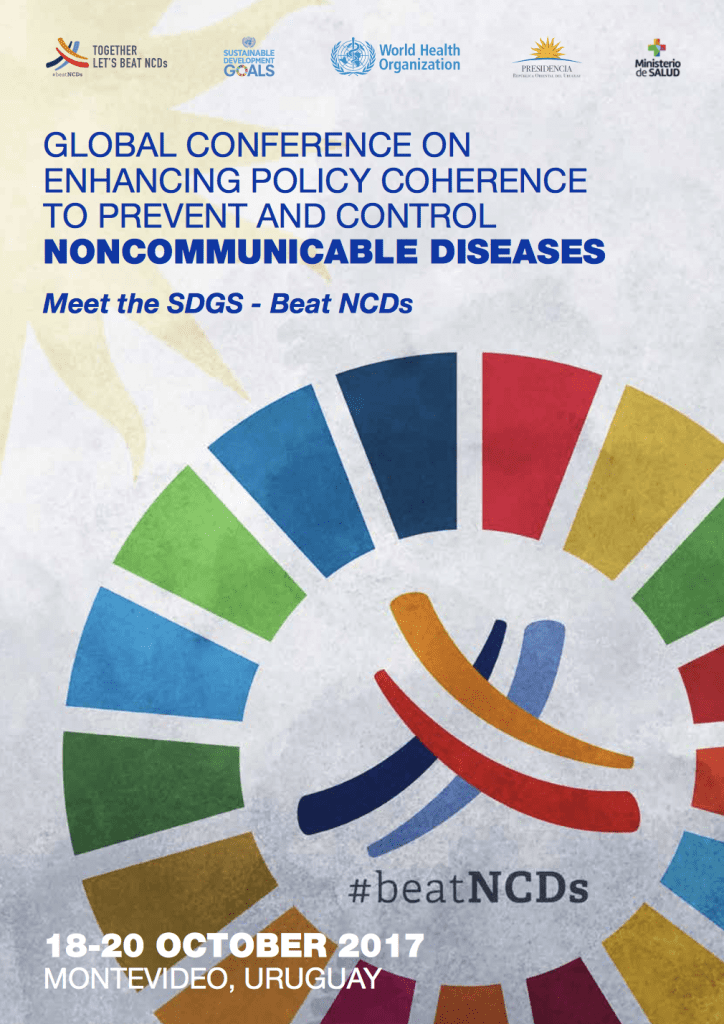
- This event has passed.
Oct 18 '17 - Oct 20 '17
WHO Global Conference on NCDs
Enhancing policy coherence to prevent and control noncommunicable diseases
WHO Global Conference on how to enhance policy coherence between different spheres of policy making that have a bearing on attaining SDG target 3.4 (NCDs) by 2030
Introduction
World Health Organization (WHO) is organizing the “Global Conference on Noncommunicable diseases (NCDs): Enhancing policy coherence between different spheres of policy making that have a bearing on attaining SDG target 3.4 on NCDs” to, by 2030, reduce by one third premature mortality from NCDs through prevention and treatment.
This conference will be held in Montevideo, Uruguay, hosted by the President of Uruguay, and co-chaired by the governments of Uruguay, Finland and Russia, from October 18 to 20, 2017, with the aim to accelerate country implementation of commitments made by world leaders in 2011, 2014 and 2015 at the United Nations and WHO in order to reach SDG target 3.4 on NCDs by 2030.
Goal of the conference
To highlight the critical links between reducing premature deaths from NCDs and enhancing policy coherence across areas that impact the governance, prevention, management and surveillance of NCDs.
Conference Objectives
- To provide guidance to Member States on how to reach SDG target 3.4 by 2030 by influencing public policies in sectors beyond health and enhancing policy coherence;
- Launch a set of new global initiatives to help countries accelerate progress in reducing premature mortality from NCDs and fast track efforts to attain SDG target 3.4;
- Exchange national experiences in enhancing policy coherence to attain the 9 voluntary global NCD targets for 2025;
- Highlight the health sector as the key advocate for enhancing policy coherence for the attainment of SDG target 3.4.
Participation
- Heads of State and Government
- Ministers of Health, Agriculture, Development Cooperation, Financing, Foreign Affairs, Planning, and Trade
- Public policy decision makers
- United Nations Organizations
- Global experts and advocates
- Non-State actors.
Program
The Conference will comprise 3 segments:
- Dialogue of Member States, United Nations organizations, and non-State actors.
- Ministerial Segment for Member States and United Nations Organizations at the level of Ministers and National NCD Directors;
- High-level Segment for Member States and United Nations Organizations at the level of Heads of State and Government and Heads of UN organizations.
Why does this conference matter?
World leaders agree that the global burden and threat of NCDs – mainly cardiovascular diseases, cancer, diabetes and chronic respiratory diseases – represent one of the major health challenges of our times.
In 2015, NCDs were responsible for 40 million deaths, representing 70% of all deaths worldwide. A large proportion of deaths were premature: over 15 million people (38% of NCD deaths and 27% of all global deaths) died between the ages of 30 and 70. 85% of premature deaths from NCDs occurred in developing countries, including 41% in lower-middle-income countries where the probability of dying from an NCD between the ages of 30 and 70 is up to four times higher than in developed countries. Most of these 15 million premature deaths from NCDs could have been prevented or delayed.
But based on the current rate of decline in premature mortality from the four main NCDs, the world will not be able to the Sustainable Development Goal target 3.4 to, by 2030, reduce by one third premature mortality from NCDs through prevention and treatment.
National policies in sectors other than health have a major bearing on premature mortality from NCDs. Health gains can be achieved much more readily by influencing public policies in sectors like agriculture, food production, pharmaceutical production, taxation, trade, and urban development than my making changes in health policy alone. One of the main obstacles at country level, however, is a lack of capacity to pursue policy coherence – across all sectors at all levels and by all actors – for reducing premature deaths from NCDs.
Planned results
The Conference is expected to result in a concise outcome document. It is expected that the outcome document will be endorsed by the participants of the Conference.
The outcome document may also serve as an input into the discussions at the 71st World Health Assembly on the preparations for the third High-level Meeting of the United General Assembly on NCDs in 2018, as well as the intergovernmental process on the outcome document for the third High-level Meeting on NCDs in 2018, which will take place under the auspices of the President of the UN General Assembly.

